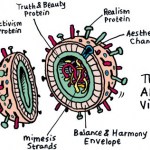
Since playing around with twitter for the last couple of days, I think I'm starting to a hit this threshold that's feeling a little like "twitter fatique." So, of course, this makes me curious as to whether such a thing has been studied. You know, in terms of behavioural sciences, but with the hope that someone has looked at it with some full-on neuroscience thrown in.
So, what does one do if one is keen to track this stuff down? Well, for starters, you can go to PUBMED, and search for the keyword "twitter."
And lo and behold, you do find a few papers. Most of them about scientific…
"Amaryllis," by Katelyn Sack
I work in the engineering school here at U.Va. My office faces a lobby-type area just outside the main computer lab for undergrads. That space has blank walls. We recently commandeered it and opened up an art gallery. The painting above is one of four currently hanging in this first installment. I make note of the exhibit here, at The World's Fair, because it seems entirely in keeping with the ethos of this blog, where in our best days we cross the so-called boundaries between scientific, artistic, and political worlds.
from KS collection
U.Va.'s…
I recently attended the TEDxVancouver event, which was wonderfully done and also useful for being able to network with a lot of interesting people. There was, however, one thing that irked me - nothing to do with the conference logistics but rather a statement or two issued by one of the speakers, Patrick Moore.
Just a little background on Patrick: he's one of the founders of Greenpeace, with a major role in the evolution of the organization in its earlier days. However, currently, he's a little more well known for his climate change skepticism views, and particularly his advocacy for…
... because I have tuesday afternoon cleared for updating the science scout site a bit. Plus, although I'm a bit apprehensive jumping into this media (more from a time suck perspective), I am keen to see if it has any utility in general for some of the programs I run.
Anyway, say hello @dnghub
Let's call this a public service announcement:
Wendell Berry will be visiting the University of Virginia in early December. He is the first in a series of four speakers for U.Va.'s Brown College Visiting Environmental Writer and Scholars (ViEWS) Lecture Series, 2009-2010. (As it happens, Rebecca Solnit, the subject here, is the third speaker in the series, next February; not to mention poet and philosopher Gary Snyder, next Spring.)
Berry will be giving a public reading at 5:30 PM on Thursday, December 3rd in the Small/Harrison Special Collections Library on campus. I'm told a reception…
I actually mentioned this video earlier, but you know, I don't think I did the pitch justice.
So...
Basically a TEDx talk by Jennifer Gardy, who outlines just how freaking fast that H1N1 information has been obtained. And all because of the open source and open access nature of the research work.
For example, when SARS hit the fan in 2003, it took 19 days for its genome to be sequenced. This year with the H1N1 swine flu, in that same 19 day timeframe, over 100 viral genomes had been sequenced, analysis had been done (and published) that worked out the origin and timeframe of the virus, and…
Carl is currently in Vancouver, and he was gracious enough to come out for drinks with us last night. This was after a great talk he gave on the how scientists have been following the evolutionary tracks of the H1N1 flu, so that folks can get a sense of (1) what it is, (2) how it's been moving, and (3) where exactly it may have come from in the first place.
The talk was apparently filmed, so I'll try and remember to pass on the link when it's up, but I thought it was worth reshowing a great little video from NPR that he highlighted.
As well, I double checked my notes and noticed that I…
So I'm based in Vancouver, Canada, and will be heading off to London, UK in July 2010, and I'm curious to hear any advice on how to best increase your chances for that low maintenance sabbatical house swap.
I've done the sabbaticalhome.com thing (link), posted on craigslist, will put stuff up on websites I have access to, have found a notice board at my own institution, but I have to admit it still all seems very much like a "shot in the dark" thing.
So, I'm wondering if the comment thread can be used to highlight any other tricks of the trade, or general advice about figuring out that…
A humour piece by David Grimes which wonders what you'd hear if you could listen in on the thoughts of such a scientist on a minute by minute basis. Here is the start but it's worth a read all the way through at this link.
Why does my hair keep falling out? Why would it skip going gray and go straight to falling out?
What if my lab coat has a stain on it and I just can't see it? Will people be able to tell this is the same lab coat I wore yesterday?
Is it going to rain? What if it rains? Do I have an umbrella in the car?
If I leave too late, am I gonna get caught in traffic and be late to…
Alex does a great job here on this topic. This would also, I suspect, take a lot of guts to do which is both inspiring and commendable.
(If you want to leave a comment about the talk, please do so here).
- - -
Topic: Alex discusses the influence of gender in his own life in this TEDx talk, describing both medical and social perspectives of gender in our daily lives and the impact and consequences these perspectives bring to every individual.
Links:
Transgender Health Program, VCH, TEDxTt09
Filmed by Craig Ross at TEDx Terry talks 2009 (October 3rd, 2009). Video edited by David Ng. See…
Is It Possible to Eat Sustainably at the University of Virginia?
Eating sustainably requires (a) that you come to some resolution about what "sustainable" means, (b) that you have the opportunity to choose so-defined sustainable foods, and (c) that the constraints of your lifestyle, geography, and socioeconomic context make it possible for you to pursue such an endeavor. Threading the needle between all of that is tricky business. Thus many have chosen to run experiments about it, or related to the larger theme, defined in various ways: the "week without" processed food; the "week without"…
Science Scout Twitter Feed
Well, actually, mathematicians - but it would probably go like this:
CD Title: Inverse: (Special limited edition release) (2009)
Artist: VAMPIRE WEEKEND
Rating: 2.718 stars (out of 5)
- - -
The rating stands. (Spoiler alert: We rounded.) Actually, we took our cue here from Leonard Euler. Our rating is actually "e," as in the sound of the squeals that will inevitably emanate from the ladies of Cambridge after they all get a hold of Inverse come two months. Yes, M.I.T.'s finest are back with a shtick to shake up the innumerate masses for whom any further mention of…
Realclimate.org has a great post today called "An Open Letter to Steven Levitt." In case, you haven't heard, this is the economist, and one of the noted authors of the Freakonomics, who recently published Superfreakonomics, a book that is fast gaining notoriety as being fraught with many errors on the issue of Global Warming.
Essentially, the post does a great job in showing how some simple arithmetic could have easily demonstrated problems in one of the claims provided in the new book (on why utilizing Solar Energy would effectively be worse for Global Warming).
It's a wonderful piece,…
(I'm guessing that at least one of my five readers are from UBC, so here goes).
Of course, this happens just before Halloween...
The other night, I moved a human anatomy torso model from my lab to my car. This was in preparation for an elementary school visit the following morning. It's basically this model shown here:
Anyway, the organs can be removed for closer examination, and essentially I dropped the brain somewhere in the transport. I'm even pretty sure where it likely fell (somewhere between the Michael Smith Labs which is next to the Bookstore, and the main parkade by the hospital…
I've just had a piece published in the Walrus, and it's also available to read at their website. Basically, the piece is about how this 85ft Blue Whale skeleton was discovered and prepped for a new museum at the University of British Columbia.
It was really quite amazing to chat with Mike deRoos, the aforementioned Master Skeleton Articulator, and it's worth mentioning that he was not the one who came up with the job title. He was as humble and nice as humble and nice can be.
Anyway, whilst finding out stuff for the piece, I had a chance to take a few photos, which you can see below. It…
Today, seedmagazine.com has a piece about Luke Jerram, the artist that I wrote about earlier (he of the incredible glass microbe structures). Anyway, I was asked to write something to go along with the piece, and have done so here.
It's funny, but I even felt a bit awkward writing this response (being asked to do a piece on Art and Science). I know I do this sort of thing in my lab, but having to comment intelligently about it feels weird to me.
Still, I do believe that precisely because "beauty is in the eye of the beholder," there's not one best way to talk science to the non-scientist…
Philip Graham is a writer and professor at the University of Illinois. Friend of the World's Fair Oronte Churm recently interviewed him. (Mr. Churm, aka John Griswold, also teaches at Illinois and is also a writer -- check out his beautiful new novel Democracy of Ghosts.) It's a good interview, right here at this link.
Graham wrote a series of dispatches over at McSweeney's about his sabbatical year in Lisbon. His new book brings them together as The Moon, Come to Earth. That would be fascinating just on the face of it since Graham's a fellow dispatcher at the McSweeney's website (as is…
Let me explain...
First take a peek at this:
I actually posted this earlier, but basically, what you're seeing here is the promotional video for a student conference, called TEDx Terry talks. This, we just finished up the other day (it was amazing and you can see the synopsis here).
Anyway, we actually launched the video way back in early September - the first day of school to be exact. We even had a booth and stuff where the video was playing, and had quite a few spritely 1st year university students walk by, look at it curiously, watch it, chuckle at it, etc. You'll note that…
If you know where the Spy Museum is, I encourage you to read "Days at the Museum #4: International Week" over at McSweeney's. If you don't know where the Spy Museum is, well, help me help you find out.
Albert Bierstadt, Among the Sierra Nevada, California,1868 (from the Smithsonian website)
Some other things you may find in this column: Italian food in Chinatown; Japanese tourists; Albert Bierstadt in Rome and California; a French fellow; green denim on Germans; the serenity of a virtuous public space; and Obama's "Hope" poster.
It's part four of Days at the Museum. Part I was noted here;…
This chart about the lack of resolution to some basic problems in Africa -- between solutions proposed in 1938 to those from 2005 -- fascinates me not only for the info it presents but for the range of responses it has elicited. It is a chart from a working paper by William Easterly, a professor of economics at NYU.*
Here is the abridged version posted by Easterly at this blog:
(
Click here
for the full version from Easterly's paper.)
Also see the interpretations of the data set at Reason.com and then at the blog Marginal Revolution. The lack of resolution to the above problems,…




